 Ryan K. Strader earned a B.A. in Russian Literature from George Mason University, an M.A.T. from Clayton State University, and a Ph.D. in Rhetoric and Composition from Georgia State University. She writes about post-Soviet writers, qualitative research methods, and writing pedagogy. She lives south of Atlanta with her husband and two kids, where she gets to read, write, and teach every day.
Ryan K. Strader earned a B.A. in Russian Literature from George Mason University, an M.A.T. from Clayton State University, and a Ph.D. in Rhetoric and Composition from Georgia State University. She writes about post-Soviet writers, qualitative research methods, and writing pedagogy. She lives south of Atlanta with her husband and two kids, where she gets to read, write, and teach every day.
FAREWELL, AYLIS: A NON-TRADITIONAL NOVEL IN THREE WORKS by Akram Aylisl, translated by Katherine E. Young, reviewed by Ryan K. Strader
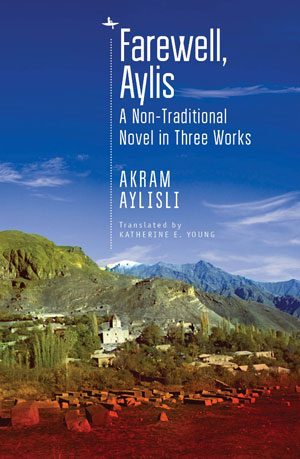
FAREWELL, AYLIS: A NON-TRADITIONAL NOVEL IN THREE WORKS by Akram Aylisli translated by Katherine E. Young Academic Studies Press, 316 pages reviewed by Ryan K. Strader We don’t often read literature from Azerbaijan, for many reasons. It’s a small post-Soviet country that is hard to find on the map, with a Turkic language that makes finding translators difficult, and a government that still censors its writers Soviet-style. We don’t generally stroll down the aisle at a bookstore and discover the “Azeri” section. The only thing harder to find might be Georgian, and I’ll only say “might.” Probably most of us have no idea what novelists in Azerbaijan write about, what kind of social justice concerns they have, or what kind of risks those writers take to address those concerns. The publication of Farewell, Aylis: A Non-Traditional Novel in Three Parts, by Academic Studies Press in November 2018, addresses these gaps in our literary exposure in several ways. For the first time we have Aylisli’s powerful and Nobel-worthy novel in English (he was nominated for a Nobel Peace Prize in 2014). Because Farewell, Aylis depicts ethnic violence against Armenians in Azerbaijan in the 1990s, Aylisli has been the target of censorship ...
SACRED DARKNESS: THE LAST DAYS OF THE GULAG, a narrative by Levan Berdzenishvili, reviewed by Ryan K. Strader
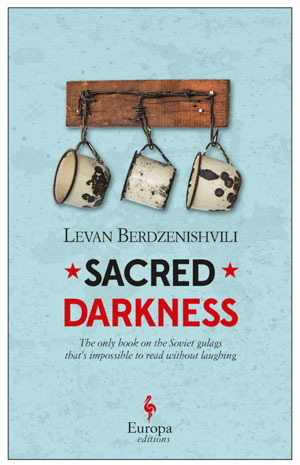
SACRED DARKNESS: THE LAST DAYS OF THE GULAG by Levan Berdzenishvili translated from the Russian by Brian James Baer and Ellen Vayner Europa editions, 240 pages reviewed by Ryan K. Strader Purchase this book to benefit Cleaver “As with any book, my book had its own special fate—it was born by mistake,” claims Levan Berdzenishvili, in the opening chapter of Sacred Darkness. Levan wakes up in a hospital, sick and disoriented, with a high fever. He realizes he has some debts to pay before he can jaunt off to Hades. Levan is a specialist in Greek literature, so he doesn’t talk of “dying.” He refers to “my departure to Hades.” Fortunately, Levan recovers from his fever and decides he has to deal with those debts. His debts have names: Misha, Borya, Vadim, and many others Levan knew when he was a political prisoner in the Soviet Gulag in 1983-1987. (The “Gulag” is a Soviet system of forced labor camps, where people convicted of everything from petty theft to political crimes were sent.) The first person Levan wants to write about is Arkady Dudkin: “I set pen to paper (or rather, glued myself to a keyboard) not to write a great ...
THE FEMALES by Wolfgang Hilbig reviewed by Ryan K. Strader
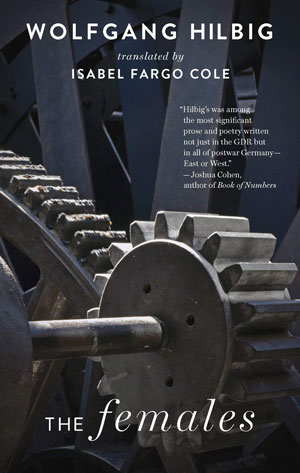
THE FEMALES by Wolfgang Hilbig translated by Isabel Fargo Cole Two Lines Press, 129 pages reviewed by Ryan K. Strader “Perhaps…I should speak of castration, castration that mutilated my interior world,” mutters Herr C., the unnamed narrator of The Females. “I wasn’t operated on, it was all left attached to me, but the cells that steered it were dimmed; my cells, certain cells of mine, were sterilized and castrated. It was a castration of the brain, and fair femininity was the forceps they used.” Herr C. is speaking from the German Democratic Republic (East Germany), and his narrative addresses the problems of gender and sex in a society where gender divisions are supposed to be a thing of the past. Herr C. isn’t physically castrated, but his masculinity is supposed to be “sterilized,” the “cells” that govern his male perceptions are supposed to have been made inert. Except, the cells did not remain inert. It seems to be a general rule of human experience that whatever is denied becomes an obsession, and it’s certainly true for Herr C.: his stream-of-consciousness narrative is shaped by “the females.” He thinks about them constantly and looks for them everywhere. Is this a failure ...
A Conversation with Translator Marian Schwartz Interview by Ryan K. Strader

A Conversation with Translator Marian Schwartz Interview by Ryan K. Strader “If books don’t get published, they don’t live,” argues Marian Schwartz, the prolific and award-winning translator of over seventy Russian works. Thanks to Schwartz, significant 20th and 21st century Russian books have been brought to life, including work by Nina Berberova, Polina Dashkova, Mikhail Shishkin, and now Leonid Yuzefovich. While doing research for Cleaver’s review of Yuzefovich’s Horsemen of the Sands, I was intrigued by Schwartz’s commitment to bringing Yuzefovich to English readers. She has translated the first of three novels in a historical detective trilogy by Yuzefovich (Harlequin’s Costume, 2001). And now Archipelago Books has just published Horsemen of the Sands, which contains both the title novella and a more recent novella, The Storm. Schwartz graciously allowed me to interview her about her advocacy for contemporary Russian literature in general, her appreciation for Yuzefovich in particular, and why we should read more translated literature.—Ryan K. Strader Ryan K. Strader: You translated Yuzefovich as early as 2001, and in a wonderful 2010 interview with The Writer’s Guide, you describe Yuzefovich as a Russian novelist who you think the rest of the world should be reading. What is it about ...
HORSEMEN OF THE SANDS, two novellas by Leonid Yuzefovich, reviewed by Ryan K. Strader
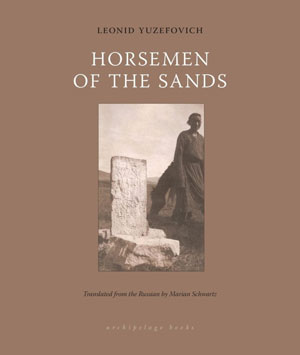
HORSEMEN OF THE SANDS by Leonid Yuzefovich translated by Marian Schwartz Archipelago Books, 232 pages reviewed by Ryan K. Strader Purchase this book to benefit Cleaver The translation initiative Read Russia characterizes Leonid Yuzefovich as a writer whose books “gray the lines between faction and fiction,” using historical figures and settings in his work. “Faction” is for artful historians (or for historian artists, perhaps), writers who know how to be suspicious of fictionalizing, but also know that history is never just facts. This description of Yuzefovich makes sense, since he is a historian by training and taught history for many years, but has emerged as an influential contemporary fiction writer in Russia. Yuzefovich has been publishing fiction and nonfiction in Russian since 1980, but his work first appeared in English in 2013 with a series of historical detective novels, translated by the prolific Russian translator Marian Schwartz. Horsemen of the Sands is a new volume, also translated by Schwartz. The volume contains two novellas: The Storm, which takes place in an elementary school, and Horsemen of the Sands, a mystical tale about the real-life warlord R.F. Ungern-Shternberg, who fought both the Chinese and the Bolsheviks for control of Mongolia ...
IVORY PEARL, a novel by Jean-Patrick Manchette, reviewed by Ryan K. Strader
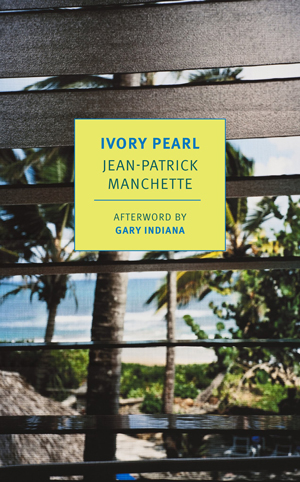
IVORY PEARL by Jean-Patrick Manchette translated by Donald Nicholson-Smith New York Review Books, 170 pages reviewed by Ryan K. Strader Purchase this book to benefit Cleaver The young heiress of a black market arms dealer is kidnapped, a kidnapper is decapitated, there are two fiery explosions, one man has been shot through and is still roaming around, and there is a rescue attempt. The rescue might be an inside operation, or it might be another kidnapping. The young heiress has vanished with a violent man who might be good or might be bad, and there are some other people looking for her, who might be good or might be bad. All this occurs on the first nine pages of Ivory Pearl. The bloody mayhem is dexterous and supple, perfectly choreographed and so cool. The cars are shiny and Italian, the weapons are exotic and expertly wielded. Ivory Pearl is Jean-Patrick Manchette’s final and unfinished novel, now available in an English translation by Donald Nicholson-Smith. Manchette was known during his lifetime for his 1970s crime novels, noir that gained popular movie adaptations and made him a standard among French crime writers. This translation features endnotes on how Manchette envisioned the novel ...
THE KREMLIN BALL, a novel by Curzio Malaparte, reviewed by Ryan K. Strader
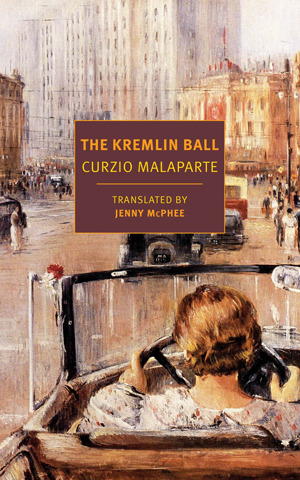
THE KREMLIN BALL by Curzio Malaparte translated by Jenny McPhee New York Review Books, 223 pages reviewed by Ryan K. Strader In his introductory comments for The Kremlin Ball, Curzio Malaparte claims that his novel is “a faithful portrait of the USSR’s Marxist nobility.” Such a thing should be anachronistic: a Marxist nobility? A communist high society? But that is exactly what Malaparte, as the novel’s narrator, is describing. In the late 1920s, the years following the Bolshevik victory but prior to Stalin’s Great Terror, the “greedy, vicious […] profiteers of the Revolution” took up the old imperial aristocracy’s places as an haute société. Malaparte describes the actresses, ballerinas, writers, government officials, athletes, and diplomats, all busy with their “court intrigues” of infidelity, peculiar obsessions, jealousies, blackmail, and backstabbing. Far from being a class of revolutionaries that Malaparte had imagined when he traveled to Moscow, these are a class of people willing to exploit revolutionary ideals so that they can enact the same class disparities that existed under the Tsars. Malaparte describes The Kremlin Ball as a “Proustian” novel, and it is in the sense that is largely an investigation of social class, with Malaparte as our “impartial” and critical ...
A CONVERSATION WITH PETER FRANCE, TRANSLATOR OF GENNADY AYGI’S TIME OF GRATITUDE by Ryan K. Strader

A Conversation with Peter France translator of Gennady Aygi's TIME OF GRATITUDE Interview by Ryan K. Strader In 1974, Peter France visited Russia to do research for a new translation of Boris Pasternak. He was invited to meet Gennady Aygi, a Chuvash poet who, as a student in Moscow, had been friends with the much-older Pasternak. France describes that meeting with Aygi as having altered the trajectory of his life, both professionally and personally. For the next forty years, France would translate Aygi’s work, bringing him to a Western audience, a task that has been criticized by those who argue that Aygi’s poetics do not conform to Russian tradition. France’s most recent publication of Aygi’s work is Time of Gratitude, published by New Directions in December 2017. Based in Edinburgh where he was a professor of French until 2000, France has written widely on French and Russian literature and has published an Anthology of Chuvash Poetry, and translations of Blok, Mayakovsky, and Mandelstam, among others. I came into contact with France while researching Aygi for Cleaver’s review of Time of Gratitude, and was taken with his warmth and willingness to discuss all things connected with Russian literature, share his photos ...
TIME OF GRATITUDE, essays and poems by Gennady Aygi, reviewed by Ryan K. Strader
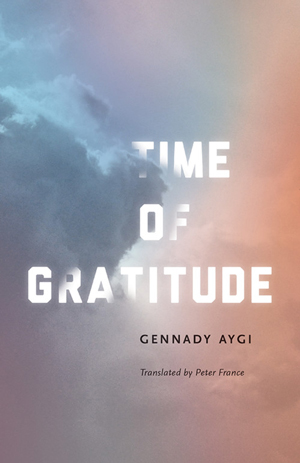
TIME OF GRATITUDE by Gennady Aygi translated by Peter France New Directions, 135 pages reviewed by Ryan K. Strader Purchase this book to benefit Cleaver When I was a twenty-one-year-old college student and had zero sense of self-preservation, I rode alone on the train in Russia several times between Petrozavodsk and St. Petersburg—unaccompanied, on an overnight train, sleeping in a bunk car with strangers. I was also very chatty because I was trying to learn Russian. Talking up Russians who wanted to sleep seemed like a way to endear myself to my bunkmates and perfect my language at the same time. At first, it was hard to start conversations. Finally, at one point, one drunk Russian man was lamenting my lack of useful knowledge—I didn’t know card games or anything about professional swimmers. “What do you study?” he asked me. When I mentioned that I knew Pasternak’s poetry, his face lit up. “Your schools aren’t complete shit after all!” he said joyously, as though his faith in American education had just been fully restored. Suddenly we had something to talk about. Poetry. Russians know their writers. That lesson stayed with me. From then on, I advanced conversationally on my bunk-mates ...
THE MINORS by Chris Ludovici reviewed by Ryan K. Strader
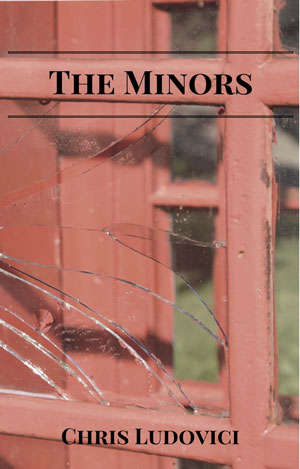
THE MINORS by Chris Ludovici Unsolicited Press, 376 pages reviewed by Ryan K. Strader Hitting a baseball is the hardest thing to do in professional sports. A fastball travels at 90 miles per hour, moving from the pitcher’s mitt to the catcher’s glove in approximately .44 seconds. If the batter blinks, he’ll miss. For the last few feet that the ball travels, it is essentially invisible to the hitter. He has to have made his decision by then, whether to swing, how he’ll swing. I did not know anything about baseball when I picked up Chris Ludovici’s The Minors. Nick Rogers, one of the protagonists, reflects on the difficulty of hitting a baseball, and I ended up spending too much time engrossed in an ESPN Sport Science episode checking Nick’s information. It turns out that, football fanatic though I am, the fastball is a formidable opponent: 90 mph is a frightening, lethal speed, and statistically speaking, it is almost impossible to hit. However, when we meet Nick in The Minors, baseball is part of Nick’s past, thanks to a shoulder injury. Back home and living with an aunt, the 28-year-old Nick tries to forge ahead by working as a ...
ALL THAT MAN IS, a novel by David Szalay, reviewed by Ryan K. Strader

ALL THAT MAN IS by David Szalay Graywolf Press, 362 pages reviewed by Ryan K. Strader In an interview with NPR, David Szalay pointed out that the title of his novel, All that Man Is, can be read two different ways: “either as a sort of slightly disparaging, sort of all that man is, and this is it. Or it can be read as a sort of almost celebratory—everything, all the kind of great variety of experience that life contains.” Szalay seems to see his work as falling somewhere in between, not entirely “disparaging” nor precisely “celebratory,” since it is a study of men dealing with situations of personal crisis. While many reviewers have described All that Man Is as bleak and depressing, Szalay confesses that he might have a “lower expectation of life than the average.” Whether the story is bleak or not, Szalay’s masterful writing has won All that Man Is significant international recognition, including being a finalist for the 2016 Man Booker Prize, Britain’s 2016 Gordon Burn Prize, and it was listed by the New York Times as one of the 100 Notable Books of 2016. Szalay is Canadian-born and currently lives in Budapest, but lived most ...
THE MADELEINE PROJECT, a work of creative nonfiction by Clara Beaudoux, reviewed by Ryan K. Strader

THE MADELEINE PROJECT by Clara Beaudoux translated by Alison Anderson New Vessel Press, 285 pages reviewed by Ryan K. Strader In 2013, a young journalist named Clara Beaudoux moves into a Paris apartment. The previous tenant, a woman named Madeleine, lived there for 20 years before passing away in her nineties. Strangely, Madeleine’s things have not been removed from the cellar. “All I had to do was open a door, the door to my cellar, for the adventure to begin,” writes Beaudoux. At first, the nature of Beaudoux’s adventure is journalistic and intellectual: curious about who Madeleine is and why she has left a room full of old memorabilia, Beaudoux decides to go through Madeleine’s items on Twitter—as she opens each box, she tweets its contents. Dishes, jewelry, old mattresses, mysterious little gadgets that have been tucked away in envelopes for decades emerge in tweeted photos, with 140 character captions: “I could see right away that Madeleine seemed to be well organized. She kept back issues of Historia.” (2 Nov. 2015) “I think Madeleine must have inherited her parents’ things too, like these coal coupons.” (2 Nov. 2015) “There are vast quantities of photographs in these suitcases, I’m a bit ...
NOTES OF A CROCODILE, a novel by Qiu Miaojin, reviewed by Ryan K. Strader
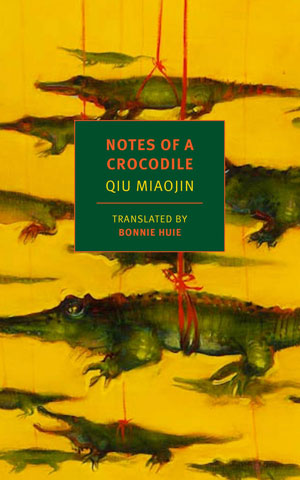
NOTES OF A CROCODILE by Qiu Miaojin translated by Bonnie Huie New York Review Books, 242 pages reviewed by Ryan K. Strader “Even if this book is neither popular nor serious, at least it’s sensational,” claims Lazi, the narrator of Qiu Miaojin’s Notes of a Crocodile. “It’s about getting a diploma and writing.” Lazi is a clever satirist though, so don’t take her at her word. As it turns out, Notes of a Crocodile was both popular and sensational in Taiwan, Qiu’s native country. Lazi does get a diploma and she writes quite a bit, but it’s hardly prosaic. Notes of a Crocodile is Lazi’s coming of age story as a lesbian at a university in the years following the collapse of Taiwan’s martial regime. In the novel, Lazi grapples with a series of relationships that teach her what self-inquiry and liberation are, how to navigate the gender labels that have warped her, and how to stop warping herself and her close relationships with her own fear and self-loathing. Lazi’s reflections are dated from the late 1980s, emphasizing the sudden public emergence of queer communities—and other Taiwanese communities oppressed under almost four decades of martial law—during those years ...
MIKHAIL AND MARGARITA, a novel by Julie Lekstrom Himes, reviewed by Ryan K. Strader
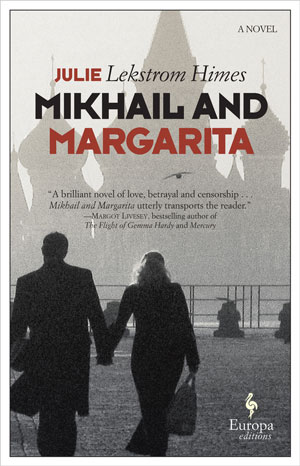
MIKHAIL AND MARGARITA by Julie Lekstrom Himes Europa Editions, 336 pages Reviewed by Ryan K. Strader Today’s Moscow has plenty for tourists who are fans of the writer Mikhail Bulgakov: museums, character statues, and guided city tours dedicated to the 20th century writer and his work, especially his most famous novel, The Master and Margarita. In 2002, I was a college student studying in Russia and Bulgakov tourism had not yet exploded; those of us with a resolute affection for all things Bulgakov had to be content to walk around Patriarch’s Ponds, a park that figures prominently in The Master and Margarita, and imagine the characters sauntering over to join us on a park bench. I used to do just that: sitting on a bench, I would imagine Professor Woland walking by and joining me, accompanied by Korovyov in his ugly trousers and Behemoth, the large cat who walks upright and carries a pistol. Professor Woland is, of all things, the devil, incarnate as a learned magician. Korovyov and Behemoth are his demonic minions. Perhaps the naked witch Hella would join us next on the bench… In The Master and Margarita this unholy group easily wreaks havoc on a Moscow that ...
